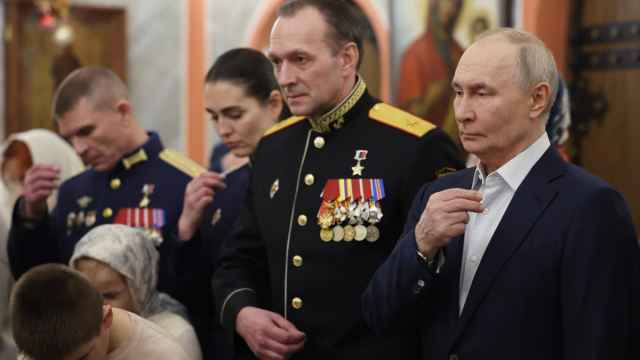For several weeks, a battle has been raging over Bank of Moscow, which was former Mayor Yury Luzhkov’s pet lender and a natural target for a hostile takeover following his dismissal.
The methods and schemes employed in this affair are enough to make investments trailblazer Henry Kravis turn pale. And the fact that all of the players hold prominent positions in the government gives the story added flavor.
Naturally, VTB is the first contender for Bank of Moscow because VTB is out to get anything and everything in Russia that either generates or squanders money. VTB bought a 49 percent stake in Bank of Moscow from the Moscow government. And Russia’s own version of U.S. financier Michael Milken — billionaire Suleiman Kerimov — bought another 3 percent share from Credit Suisse.
Bank of Moscow president Andrei Borodin held another 20 percent share. VTB wanted to buy that share from Borodin, with Igor Yusufov, President Dmitry Medvedev’s former special representative on foreign economic relations and energy minister, acting as mediator. What’s more, a warrant was issued for Borodin’s arrest to drive down the value of his stake.
But then, instead of acting as mediator, Yusufov bought the 20 percent stake himself for $1.1 billion, with his son’s company, Nordic Yards, guaranteeing the purchase.
Nordic Yards itself has an interesting history. It started with the state-owned Federal Leasing Company, which was supposed to build airplanes. The company had a charter capital of $500 million and posted another $250 million in eurobonds. With that money, the Federal Leasing Company bought a bunch of Maybach cars and Vertu cell phones, spent $16 million renovating its offices and for $360 million purchased a dilapidated shipyard called Wadan Yards, located in an eastern district of Germany that makes up one of German Chancellor Angela Merkel’s strongest constituencies.
But wait a minute. Are airplanes built in shipyards?
The shipyard went bankrupt and was sold to Igor Yusufov’s son, Vitaly, for $58 million. As a result of that little development, the former head of the Federal Leasing Company was arrested for fraud.
During a meeting with Medvedev, Merkel reportedly asked how matters with the shipyard were coming along. “What shipyard are you talking about?” Medvedev asked.
“The one in which Prime Minister Vladimir Putin and Deputy Prime Minister Igor Sechin had a hand,” Merkel answered.
Medvedev’s jaw dropped. Whatever Putin and Sechin might be guilty of, they had no relation to the shipyard.
Because the shipyard was in Merkel’s constituency and she had taken a personal interest in its fate, the Russian government appealed to several oligarchs to start placing orders with the concern. We’re talking about a defunct shipyard purchased with $360 million of government money and sold for one-sixth that amount to the son of a man advising Medvedev on foreign economic policy.
Yusufov was fired over the incident.
Imagine something similar happening in the United States. A senior State Department official holds talks on behalf of a state bank to purchase a stake in Merrill Lynch for pennies on the dollar. To drive down the asking price, the official issues an arrest warrant for the CEO of Merrill Lynch, after which the company is purchased by the official’s son. In the United States, this scam would cause heads to roll among the country’s top officials. In Russia, it hardly raises an eyebrow.
Yulia Latynina hosts a political talk show on Ekho Moskvy radio.
A Message from The Moscow Times:
Dear readers,
We are facing unprecedented challenges. Russia's Prosecutor General's Office has designated The Moscow Times as an "undesirable" organization, criminalizing our work and putting our staff at risk of prosecution. This follows our earlier unjust labeling as a "foreign agent."
These actions are direct attempts to silence independent journalism in Russia. The authorities claim our work "discredits the decisions of the Russian leadership." We see things differently: we strive to provide accurate, unbiased reporting on Russia.
We, the journalists of The Moscow Times, refuse to be silenced. But to continue our work, we need your help.
Your support, no matter how small, makes a world of difference. If you can, please support us monthly starting from just $2. It's quick to set up, and every contribution makes a significant impact.
By supporting The Moscow Times, you're defending open, independent journalism in the face of repression. Thank you for standing with us.
Remind me later.





